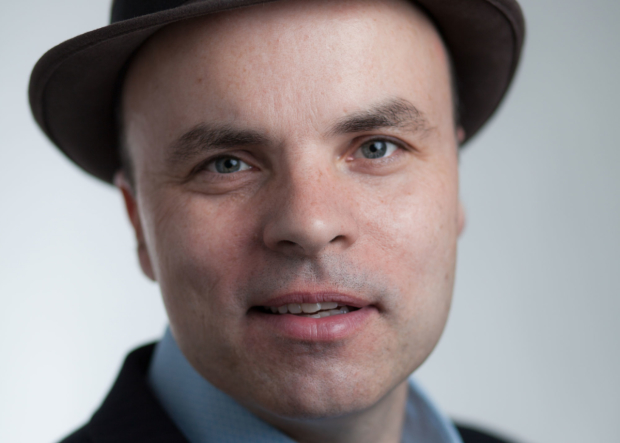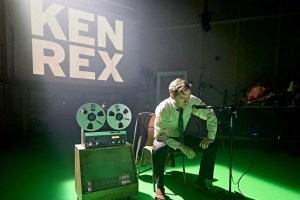JT Rogers: 'We've all been pummeled by bad political theatre'
As his Tony Award winning play opens at the National Theatre, playwright JT Rogers explains why his piece isn’t just a dry political thriller and why he got star struck meeting Stephen Sondheim

© Rebecca Ashley
In June 2016 JT Rogers’ newest play Oslo opened at the Lincoln Center in New York. An epic work of historical fiction – which looks at true-life secret peace negotiations in the lead up to the 1993 Oslo Peace Accords – it was an immediate hit. It transferred to Broadway in 2017 and won a host of other plaudits including the Tony Award for Best Play. It was then announced Oslo would transfer to the National Theatre and subsequently run in the West End. Not bad for a long play about little-known political negotiations. But Rogers has form in making historical events thrilling – Blood and Gifts covered the control of Afghanistan during the 1980s while Madagascar is set to the backdrop of the Rwandan Genocide. Here he explains why Oslo works and how it is actually pretty funny.
I read the New York Times review which described Oslo as a ‘big play’. Is that fair?
It is a big play. It will easily fill the Lyttelton. It has a cast of 14 playing 20-odd roles. I guess the best way to describe it is an intellectual thriller. On the one hand you’re learning all the secrets of these negotiations but it has the ticking clock of a thriller. There’s people risking governments, and in some places their lives to be having these secret meetings. There’s drinking heavily in the dead of night and talking with your enemies. It’s basically about this young Norwegian couple who hatch an idea to get the Palestinian Liberation Organisation and Israeli government to come to Norway secretly and meet in a manor house in the middle of winter and see if they could come to a peace agreement.
It travels across the world too, is it very difficult to stage?
Audiences are so savvy and sophisticated these days – you don’t have to watch people walk to the door, you can just cut. That gives you the ability to travel great distances with dramatic effect. While in no way being stylised, it’s completely choreographed.
Is it a bit like The West Wing?
I’ll always take an Aaron Sorkin reference. I would say it connects to that in that it is deep dive politics whilst also being tremendously entertaining. The thing people have said is that they had no idea it would be so funny. We’ve all been pummeled with the bad political theatre…
How did you find out about the peace talks on which Oslo is based?
There was the famous handshake in 1993 on the White House lawn between Israeli prime minister Yitzhak Rabin and Palestinian leader Yasser Arafat. Many people thought it was orchestrated by the White House and Bill Clinton but in fact there were these clandestine negotiations by this young Norwegian couple. I discovered that about three years ago because the now director of the show, Bartlett Sher, knew the two diplomats involved – Mona Juul and Terje Rod Larsen. I started picking their brains.
So they didn’t want to keep it on the quiet?
The negotiations are a secret in plain sight. It’s not really known about in the States. The Norwegians know about it, the Israelis and Palestinians do, but most of the world knows nothing about it.
How close are the characters to their real life counter parts?
I had rules that the characters onstage weren’t allowed to speak ideas that were dramatically counter to the ideas of the actual people. But I could take liberties, I could condense.
Have you always been in to global politics?
I was raised by academics, scientists, artists – that was all the bread and butter of the kitchen table. The story with a larger backdrop, like this play and the last three plays I’ve done, can make for great storytelling. It’s not like I’m trying to educate the audience, or have a political axe to grind, it’s just more interesting if you can tell a story about kings and wars and intrigue.
You’re here at the National, Stephen Sondheim has been here recently too. Would you ever write a musical?
Stephen and I have bumped into each other already! He’s one of the handful of people that I get starstruck about. I would love to do a musical for a couple of reasons. One because it’s not like anything else I’ve done, but also I think my work has got more musical. I came late to musicals – I was raised that they were the work of the devil. Like cheesy horror movies. It was in my 30s that I started getting a sense of them. I saw Bartlett's Fiddler and his King and I which were extraordinary.
How did you come to start writing plays?
I had always wanted to be an actor since I was a kid. While I was in drama school we’d do classes all day and then they would give us the keys to the rooms to rehearse our own thing all night. I was writing these short pieces and there were lots of great actors there, and an audience of people. The paradox was that I became a much better actor because I wrote. I thought: ‘If I get cast in this, that’s great, but if I don’t I could write a play’. It meant I wasn’t set on it. Then I came to New York and started a theatre company with my best friends and my now wife. Back then you could rent a pub theatre for hardly anything a week.
Does that scene not exist anymore?
I think the prices in London and New York are driving young artists out of the city. And the city is more impoverished as a result. Now you have young writers and directors doing readings and workshops endlessly because it’s too expensive to risk giving them a production. I think playwriting has moved to a lot of graduate writing schools like Yale and Harvard and a lot of places that have no business taking people’s money. We have this explosion of trained writers for an ever-shrinking pool of slots and it's unsustainable.
Oslo runs at the National Theatre until 23 September before running at the Harold Pinter Theatre from 2 October to 30 December.















